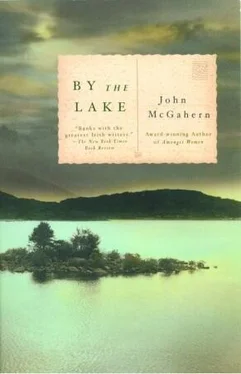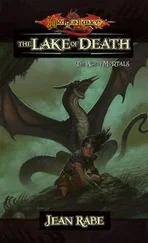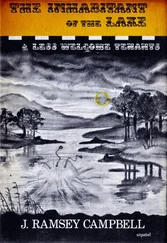“A great house. A pure feast. A lamp lit in the middle of the summer,” Jamesie said. “Wasteful. Wasteful. Children dying in Africa.”
“A lot he knows about Africa when he didn’t even know where Italy is! Men never quit about the lights and they’d drink as much whiskey in a day as would light a house for a year.” Drinks were poured. They were more tired than hungry after the work and heat. The soreness and tiredness became delicious in the drowsy glow of alcohol. Nobody wanted to sit at the table.
Margaret stood by Jamesie’s chair and he touched her hair and pulled at her ribbon. For the rest, they were content to sit and watch the light. The child stayed by his chair until the black cat came cautiously into the room. As the light faded, the sky beyond the dark shapes of the trees softened to a glow, and the room became enormous as it reached out to the fields and the trees in the long, velvety light of the sky.
“In weather like this but a little later Jamesie’s father died,” Mary said quietly. “They were building the hayrick in the yard where the hayshed is now. The father was sick in bed but couldn’t stay away from the window. ‘They are putting it up wrong,’ he’d cry out in a rage. Why worry yourself about them? It’ll be their lookout, I’d say, and try to coax him away from the window. But he’d not be five minutes back in bed in the lower room when he’d be back with his nose pressed to the glass like a bold child.”
“Were they putting up the rick wrong?”
“Not at all. They were putting it up different to the way he put it up. The string of curses was terrible: it’d fall, let in rain, rot, there wouldn’t be a mouthful for the cows. I’d coax him back to bed again but in no time he’d be back at the window with his nose pressed to the glass. This went on for the whole of the day. I was getting food for the men. Part of the time I had a job to keep a straight face. When they came into the house to eat he went down to the room and banged the door shut and never appeared again until they left.”
Jamesie sat in absolute silence while Mary spoke. When she finished he added, “My father was thick and ignorant but he adored Mary. He didn’t want her in the house at first but by the end he adored the ground she walked on.”
“He wouldn’t talk to me when I first came into the house but by the end he wouldn’t even take a drink of water from the hand of anybody else.”
“A week or so after the rick was built I was putting out topdressing with the little mule. Nothing would do my father but come out to help. It was weather like this, wonderful weather. He should have been in bed but you could tell him nothing. I passed no heed. Then he called me over. His graip, he said, was stuck. I could have laughed out loud. A child could have lifted the graip. It wasn’t stuck at all. He hadn’t the strength. It was then I saw there was something badly wrong. It was as much as I could do to get him back to the house. He only lasted three days.”
“I had to stay with him,” Mary said. “He’d get all worried if I tried to leave for even a few minutes. In the end he just faded. It was as peaceful as anybody could want.”
“He seems to have been more like Johnny than Jamesie,” Ruttledge said.
“Far more. That’s why the two were never able to get on. I don’t know where they got Jamesie. He wasn’t a bit like any of them.”
“The cuckoo!” he cried.
“Where do you think Johnny is at this minute?”
Jamesie drew back his sleeve but had difficulty telling the time in the muted light. “In the Prince. He’s bound to be in the Prince at this time. Unless the darts team are playing away.”
“People we know come and go in our minds whether they are here or in England or alive or dead,” Mary said with a darkness that was as much a part of her as the sweet inward-looking smile. “We’re no more than a puff of wind out on the lake.”
A loud knocking came from the porch with the sound of Bill Evans’s stick on the floor, the heavy brushing of his Wellingtons in the slow walk. “God bless all here,” his glance flitted from face to face until it fastened on the lighted table and stuck. His eyes wolfed the table.
“It’s not often we see you twice in the same day,” Kate said. Margaret left Jamesie to stand close to Mary. The black cat raced from the room.
“I hadn’t much to do above and I battered down to see how you were all getting along with the hay.”
“We have it all safe. You’re too late,” Jamesie said ironically.
“You’ll eat something?”
“Begod I will, Kate, quick,” he said, and when he was seated in the rocking chair with a large plate of sandwiches by his side, he said grandly, “You’re all very welcome to this side of the lake.”
“We are all very glad to be here,” they answered, suppressing their laughter.
“Did ye cut up there yet?” Jamesie teased.
“No.” Bill Evans felt at a disadvantage. “The meadows aren’t ready yet.”
“Anybody who hasn’t his meadows cut this evening is lost.”
“You were always a sight for blowing, Jamesie,” he said.
“That’s right, Bill. Give it to him,” Mary said.
“I’m well able to put him in order. I’ve been watching his capers for years,” he said, and Jamesie responded with a light cheer.
“Bill is going to the town soon,” Ruttledge said.
“Every Thursday. The bus will be coming to the gate,” he boasted.
“Good man, Bill,” Jamesie said agreeably.
“A whiskey, Joe, before I go,” he demanded.
“You’re not used to it, Bill,” Ruttledge said, but poured him a moderate whiskey, adding plenty of water.
He downed it in one swallow. “Another, Joe.”
“No, Bill. It would only get you into trouble,” he said, and walked him to the gate. He had no buckets and turned straight uphill, the stick reaching out in the crab-like, sideways walk.
The night air was sweet with cut grass and meadowsweet and the wild woodbine. A bird moved in some high branch and was still. The clear yellow outlines of the stacked bales were sharp in the ghostly meadow under the big moon and the towering shapes of the trees. Headlights of a passing car from across the lake were caught like little moons in the windows of the porch as it travelled towards Shruhaun. They had all risen to leave when he got back to the house.
“You must be tired. We’ll run you round the lake in the car.”
“No. We’ll walk. We had a powerful evening. Who wouldn’t want to walk on a night the like of that?” Jamesie said.
“The night is perfect but it’s been too long a day. Sit in the car.”
Ruttledge knew not to take the words at face value. They were glad to sit in the car and be driven, Mary and Margaret holding the two dogs in their arms. Jamesie’s head started to droop towards his chest as they drove.

Kate’s intuition was right that there was something on the Shah’s mind. He praised the cleaned meadows and the stacked bales when he rolled up to the house in the big car at his usual time on Sunday, but his mind was elsewhere. He could hardly wait to unburden himself.
Clearing his throat loudly he announced, “I’m thinking of retiring,” as if he couldn’t quite bring himself to believe his own words.
“There’s nothing wrong with you, is there?” Ruttledge was equally surprised.
“No,” he laughed defensively.
“Why do you want to retire?”
“There comes a time. There are some old cunts going around who think they’ll never disappear. I wouldn’t want to be one of those.”
The silence of the room was strange. To think of the Shah as retired was as difficult for the Ruttledges as it was for himself but Ruttledge knew that it would have been carefully considered and thought through.
Читать дальше













